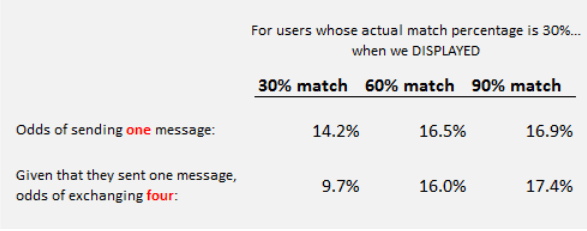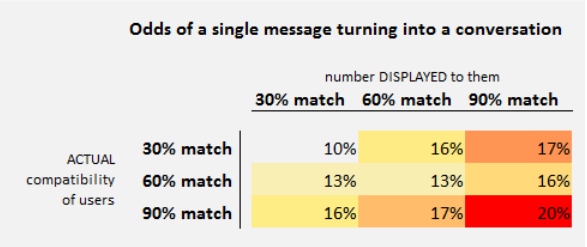It was the Facebook study heard ’round the world. In June, the social network revealed that it had briefly tweaked its algorithm for a lucky (or unlucky) 698,003 users to make them feel happier (or sadder) based on what they see on their Newsfeed. The reaction to human experimentation—creepy emotional manipulation! mind control!—came out so strong, that Senator Mark Warner (D-Va.) asked the FTC to investigate.
Christian Rudder, the co-founder of dating site OKCupid, was shocked by the internet’s shock. “It’s just a fact of life online,” he says. “There’s no website that doesn’t run experiments online.”
And so, Rudder posted OKTrends’ first blog post in three years Monday to announce to the world, “We experiment on human beings!”
Rudder relaunched the site with the revelation that “OkCupid doesn’t really know what it’s doing,” which is why it uses human guinea pigs. And to be honest, “If you use the Internet, you’re the subject of hundreds of experiments at any given time, on every site.”
For example, OkCupid decided to run an experiment in which it told people who were bad matches (30%) that they actually had a compatibility score of 90%. And the result was that they were far more likely to exchange four messages — aka an actual “conversation” — with a bad match they thought was good than with a bad match they knew was subpar.

Luckily, OKC investigated further and found that all online daters aren’t just sheep. Matches were far more likely to have conversations with people they were actually matches with as opposed to people they were told they were good matches with.

Other experiments can be found in the OkTrends blog post.
Rudder argues that some online experiments can lead to offline life changes, like when Facebook tests out a new layout on a small percent of users to see if it’s more effective. “My wife’s Facebook was ordered differently than mine,” he says. “You know, I’m not saying that we are now totally different people, but she saw some news that I didn’t see and she reacted to it and whatever.”
Or the changes can be bigger, Rudder says. “On OkCupid, when we make a change, even a mundane one, that changes who people talk to, who they flirt with, who they go on dates with, and I’m sure in some cases who they get married to.”
At the end of the day, Rudder thinks, “If you like Facebook or think that Reddit is a good thing or OKCupid is a good thing, then almost by definition experiments can be good. That’s the only way you get from Facemash, which Mark Zuckerberg made in his dorm room, to Facebook.”
More Must-Reads from TIME
- Donald Trump Is TIME's 2024 Person of the Year
- Why We Chose Trump as Person of the Year
- Is Intermittent Fasting Good or Bad for You?
- The 100 Must-Read Books of 2024
- The 20 Best Christmas TV Episodes
- Column: If Optimism Feels Ridiculous Now, Try Hope
- The Future of Climate Action Is Trade Policy
- Merle Bombardieri Is Helping People Make the Baby Decision
Contact us at letters@time.com